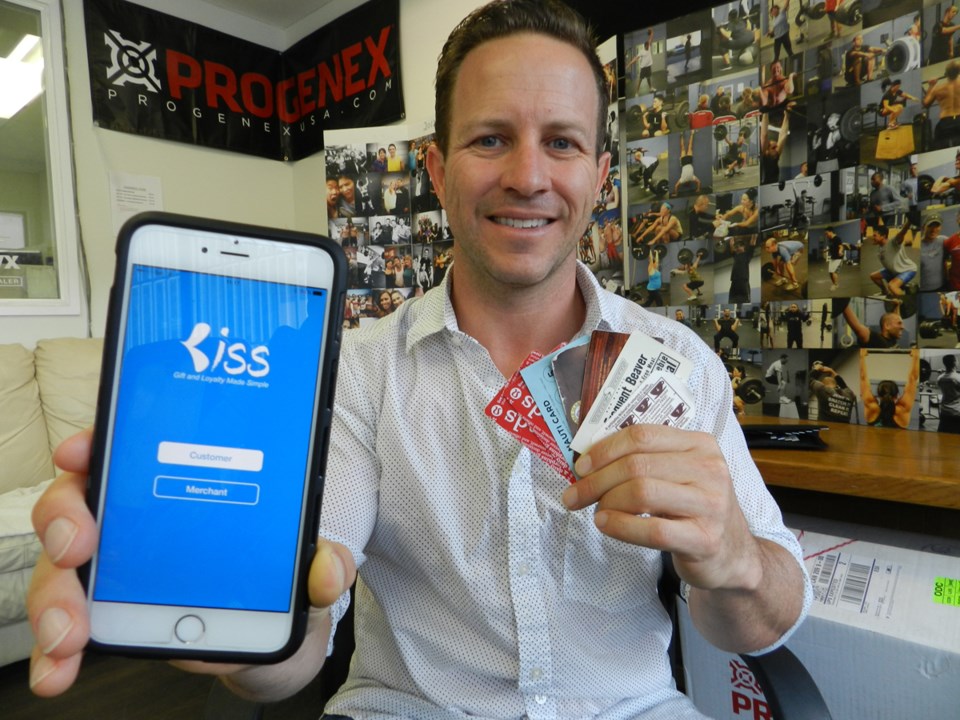Richmond entrepreneur Owen Clark would like to lighten your wallet.
Now, before you get the wrong idea, Clark’s goal is based on convenience, not draining your hard-earned funds.
And it’s a simple one, hence the name for a new smartphone app he’s had developed called Kiss, which stands for Keep it Super Simple.
Essentially, it rolls a gift card and loyalty card into one and puts it on your phone. No more cramming a multitude of cards for different businesses into your wallet. Simply whip out your smart phone, open up the KiSS app and you have access to pay for goods and services, and collect reward points if the business you’re shopping at provides them.
“It’s a digital e-card and loyalty program card that are combined,” Clark said. “It creates synergy.”
No more would you have to worry about expiring gift cards or forgetting to have the right one in your wallet to collect points.
“We’re going to a paperless, card-less environment,” Clark said. “Pretty much everything is on your phone already, right?”
How long it will take before we all go to digital payments is debatable, but Clark figures it’s possible within the next generation.
“The generation that is really going to take this by the horns is not the earning generation yet,” he said. “Maybe they are on the cusp right now. I am 43, and I grew up with credit cards, all physical stuff. So, I am an early adopter of this, for sure.
“But it’s only a matter of time until the next generation takes over the role of spending.
“It’s 2016. DVDs have come and gone. CDs have come and gone. But credit cards and physical (gift) cards are still here. I don’t think it’s too much longer until those are gone, as well.
“You can see it with things like Apple Pay.”
When he looked at the customer loyalty and reward point side of the KiSS app, Clark said he assessed his own consumer patterns to see how effective it can be to drive consumers to a business that, when coupled with a pay system, can encourage a transaction.
“When I looked at my own habits I found, for one example, that I’ll drive three of four minutes out of the way to go to an Esso station because I have an Esso Speedpass to collect points to eventually get enough for a free car wash.
“Had I done the math to see how many points I needed to get that free car wash? No.”
The same went for a trip to Shopper’s Drug Mart where he forgot to take his loyalty card on one occasion and was told he could come back with his receipt within a week and be credited with the purchase points.
“So, I went out of my way to go back later, got my points, did the math and realized that return trip was worth about a nickel,” he said.
As for encouraging transactions, having a balance on a store’s card can induce the feeling of money already spent.
“A balance on a card or smart phone is like having a casino chip – it’s like play money. It’s free money because it’s already there.”
He used a scenario from real life to illustrate the point.
“I was at a Starbucks a couple of weeks ago with my kids who wanted a drink, but I had a zero balance on my Starbucks card,” Clark said. “I could have paid cash, but I wouldn’t get (loyalty) points. So, I re-loaded my Starbucks card with $25, got my points, which brought me closer to a reward, and spent only three or four dollars. Now, I had a balance.
“So, the next time when I am out and want a coffee and see a Waves coffee shop on one side of the street and a Starbucks on the other, which one am I going to go into? It will be the Starbucks because I won’t have to spend any more money.
“And the pattern continues.”
Clark got into the business world 26 years ago when he was just 16, when his father turned over the day-to-day running of a fabric glue called Speed-Sew.
“My dad acquired a company and gave it to me and my brothers to learn business through reality instead of theory. And I am still running it,” he said. “And the biggest thing about doing that is you have real clients with real money, real timelines and deadlines. And you have to deliver a quality product, otherwise people stop buying it.”
It also drove him to create his own future.
“The thought of getting up and going to work for someone else doesn’t work for me. I like being in control of my time.”



